Disclaimer: This guide is not government-affiliated. Information provided as-is without warranty of accuracy. Contact your local housing authority to verify current information. | Last Updated: September 24, 2025
You already know North Carolina’s Section 8 game is rigged—waitlists that vanish overnight, offices that never call back, and a system built to make you give up. But after months of fighting through it myself, I’ve got the hacks and shortcuts you will NOT find on any government site—real steps that actually get your name to the top of the pile. Read on right now, because missing even one of these tactics could cost you an entire year of waiting.
Critical Legal Info for North Carolina
North Carolina can be a tough landscape for renters with vouchers—state law doesn’t make it any easier. There’s no statewide rule stopping landlords from turning down Section 8, but in Charlotte, landlords who receive city financial incentives can’t discriminate against voucher holders. Everywhere else, it’s still legal. Save every message and rental ad in case you run into unfair treatment.
You’re Looking for Affordable Housing in North Carolina—Here’s What to Know
Look, I get it—this isn’t some class assignment or idle curiosity. You’re here because an eviction notice is taped to your front door, or you’re dodging calls from the hospital over bills you’ll never pay, or your paycheck disappears before you even see it. Or maybe you’re staring at your kid asleep on the couch, heart pounding because you seriously don’t know if you’ll have a roof over your head next month. You’re not the only one.
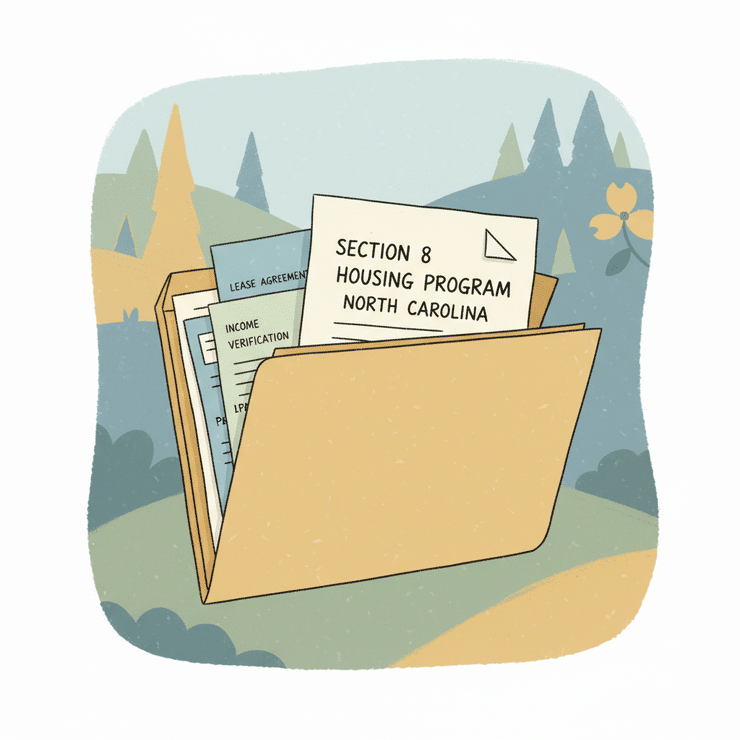
Here’s what actually happens: The 2 AM Google searches. The panic. The mountain of paperwork that feels like it’s designed to make you quit. You call ten numbers, leave voicemails, and get maybe one call back—if you’re lucky. You get put on hold, transferred, told to call back later, told the waitlist is closed, told you need paperwork you’ve never even heard of. Yeah, it’s brutal.
The truth nobody tells you: This system is supposed to wear you down. They don’t say that out loud, but if you’re not persistent, they just move on to the next person. It’s not your fault you’re in this mess, but you still have to play by their rules to even have a shot. The system doesn’t care about your story—they care if the boxes are checked and the forms are filled out, end of story.
So here’s what I’m going to give you: the real lists you actually need to check (not some outdated web directory), the emergency loopholes nobody mentions, and the play-by-play of how North Carolina’s housing offices really work. This isn’t the stuff you’ll see on the official sites. No sugarcoating, no “resources may be available”—just exactly what you do next, step by step, so you can stop spinning your wheels and start getting somewhere. Yeah, it’s messed up, but here’s how you deal.
Section 8 Is Available in Every North Carolina County—Don’t Let Them Tell You Otherwise
Let’s cut through the crap: Section 8 is in every single North Carolina county. All 100. No loopholes, no missing spots, no “your area isn’t covered” excuses. Here they are—don’t let anyone tell you otherwise:

Wake • Mecklenburg • Guilford • Forsyth • Durham • Cumberland • Buncombe • Union • Johnston • Cabarrus • New Hanover • Gaston • Onslow • Iredell • Alamance • Pitt • Davidson • Brunswick • Catawba • Rowan • Orange • Randolph • Harnett • Henderson • Wayne (and the other 76—yes, all 100).
Here’s what actually happens: Housing authorities are slippery. A single authority can cover two, three, sometimes even five counties. Just because you live in Johnston doesn’t mean you’re stuck with Johnston’s list. You might have to apply through Wake—or wherever the waiting list is actually open. Loyalty gets you nowhere here. If another county’s got an open list, jump on it. Nobody’s checking your county pride.
The truth nobody tells you: You should be applying to EVERY open list within 100 miles. Don’t get cute, don’t get picky. North Carolina’s Section 8 waitlists open and slam shut with zero warning. One week you’re waiting, next week the door’s closed for another year. Cast a wide net. Search “Section 8 waiting list [your county]” but don’t stop there—look up every city and county you can drive to. Some sites are ancient and ugly, but ignore the look—just find where the list is open.
Yeah, it’s messed up, but here’s how to deal: If you’re near the border? Go rogue. South Carolina, Tennessee, Virginia—all fair game. Most people don’t realize you can apply out-of-state. Sometimes their lists are way shorter, or they use a lottery system that actually gives you a shot. The only rule is, you can’t win if you don’t get in the line.
Here’s the timeline nobody wants to say out loud: Wait times are brutal. In the big cities, you’re looking at years—sometimes five, sometimes more. Some places reset the whole list every time they open, like a lottery, so even waiting doesn’t guarantee you anything. You can’t game the system, but you can chase every single opening. The only thing you can count on is that it’ll change, and if you’re not watching, you’ll miss it.
What You Need to Know About Section 8 in North Carolina
What Section 8 Actually Is in North Carolina
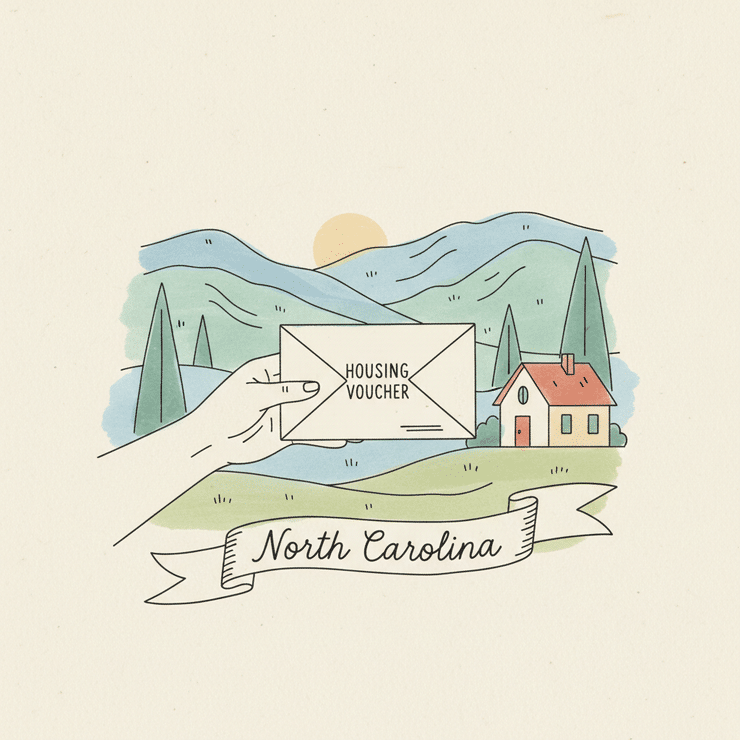
Let’s cut through the noise: Section 8 (officially the Housing Choice Voucher Program) is the government paying most of your rent if you can actually snag a voucher. Don’t get it twisted—you’ll usually pay about 30% of your income, and the feds cover the rest. But getting a voucher is the hard part.
Here’s what they won’t tell you: there are two flavors you need to know about. First, the standard voucher—this one lets you find your own place, as long as the landlord is cool with Section 8 and the rent fits the rules. Second, there’s something called Project-Based Vouchers (PBVs). These are locked to specific apartments or buildings. Don’t sleep on PBVs. They’re not just “for old folks.” Sometimes these open up way faster than the main voucher list, and if you need something stable (especially if you’re a senior or have a disability), PBVs can be a golden ticket. When you call, ask about both. Use the phrase: “Do you have any project-based openings?” Most people never ask, and a lot of housing staff won’t volunteer that info unless you push.
What the Section 8 Application Process Looks Like in North Carolina
Here’s what actually happens: the line for Section 8 in North Carolina is brutal. In 2023, there were over 229,000 people already living in subsidized housing, but the actual waiting list is even longer—think DMV, but if getting tired meant you slept outside. The reality nobody tells you: average wait is 21 months. That’s almost two years, but honestly, it could be longer if you’re in a hot city or shorter if you’re out in the sticks. Pro tip: look up counties like Bertie, Hyde, or Jones if you’re desperate. Less competition means lists move a little faster.
Only about 110,000 households actually get served, and the program is capped at 83% utilization. Translation: even if you qualify, there’s a hard ceiling. Not everyone gets in. Don’t bank on getting a call next month. But don’t give up, either—people drop off the list all the time (they move, forget to update info, or just give up). Stay on their radar. You can’t afford to be passive here.
Section 8 Myths and Misconceptions in North Carolina
Here’s the truth nobody tells you about Section 8:
- Myth: “If I just wait at home, they’ll call me.” Nope. You have to hunt them down. Call and check your status every few months. Use phrases like: “Am I still active on your waiting list?” and “Can you confirm my application date?” If you move or change your phone number and don’t tell them, you’re basically erased.
- Myth: “Section 8 is only for families or seniors.” Nope again. Single adults, people with disabilities, anyone low-income—you’re eligible. Don’t let anyone at the desk tell you otherwise.
- Myth: “If I move, I lose my spot.” Not always true. Your place on the list is tied to the housing authority, not your street address. But if you move counties, double-check with both offices before you pack. Phrase to use: “Will moving impact my waiting list status?” Don’t let fear of losing your spot trap you somewhere unsafe or unaffordable.
Yeah, it’s messed up, but this is the game. Now you know how to play it better than most.
Step-by-Step Guide to Applying for Section 8 in North Carolina
Here’s what actually happens if you want Section 8 in North Carolina in 2025: you don’t just wait around for some magic list to open. You get proactive and a little ruthless about it, because the system is not on your side.
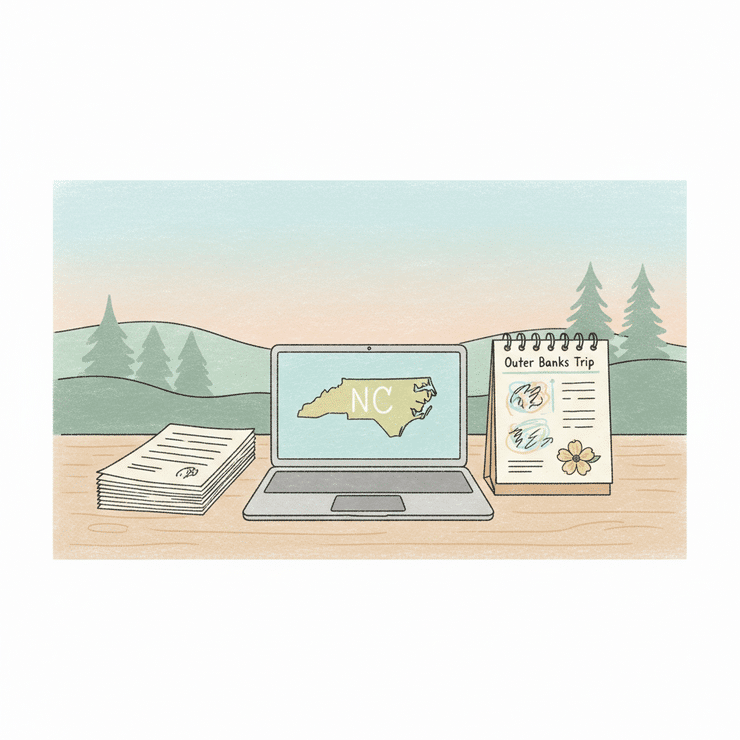
First move: Google “[your county] housing authority” AND every neighboring county’s authority. Don’t just stop at the one down the street—draw a 50-mile circle around where you are and map them all today. This isn’t overkill. Some lists are closed for years, but a random county 40 minutes away might open for two days and if you miss it, you’re out for another year. Yes, you need to do this for real. Don’t trust the first search result—there will be junk, old info, and the official websites look like they were built in 2003.
Next, gather your documents NOW. Not tomorrow, not when you “have time.” Section 8 does not wait for you to track down your birth certificate. Get:
- Birth certificates for everyone in your household
- Social security cards (again, for everyone)
- Last 3 pay stubs
- Recent bank statements
- Your current lease (even if it’s expired or handwritten, get whatever you have)
- Any medical paperwork you might need (disability, chronic illness, etc.)
If you’re missing even one thing, you can get booted from the process and have to start over. They don’t care if your cousin lost your social card five years ago—if it’s not uploaded, you’re invisible.
Set up a spreadsheet. Authority Name, List Status, Date Applied, Login Info, Next Check Date. This is not busywork. This is survival. You will lose track without it, and the housing people will absolutely lose your info. When they do, YOU are the one who has to prove you exist and when you applied. Keep every confirmation number, every login, every date. This is your ammo.
When you call, don’t overshare. Use this exact script: “Hi, I need to know if your Section 8 list is open and when the next opening might be.” That’s it. No sob stories, no explaining your eviction, no asking for advice. They just want to get you off the phone. Get the facts and hang up. If they say it’s closed, ask for the next expected opening. Write it down.
Here’s the truth nobody tells you: When a list opens online, the site WILL crash. Not maybe. It will. Set alarms for the exact opening time. Have every document pre-scanned as a PDF (not a photo, not a screenshot—a real PDF). Be ready to hit submit the second it opens. If you’re not fast, you’ll be number 1,938 and they’ll close the list at 2,000. That’s how tight it is.
Every 30 days, follow up. Not 29 (they’ll roll their eyes and maybe even flag you), not 31 (they’ll forget you ever applied). Calendar it and send a quick, “Just checking my status.” It keeps your name fresh and proves you’re paying attention. If you don’t, they’ll drop you the first time a letter bounces or they can’t reach you.
Yeah, it’s messed up, but here’s how to deal: Hustle now, stay organized, and never trust that the system will remember you. You have to make them remember.
How to Track Down Section 8 Resources in North Carolina
Here’s what actually happens: no one’s going to spoon-feed you the info you need. If you want a shot at Section 8 in North Carolina, you need to hunt it down. Forget those useless pamphlets—they’re outdated before you even finish reading them.

Start with these exact Google searches (don’t get creative, just copy/paste these and swap in your county or zip):
- “Wake County housing authority waiting list”
- “North Carolina Section 8 application”
- “affordable housing [your zip code]”
Do this for every county even remotely close to you. If you’re desperate, cast a wide net—sometimes the county next door has a shorter wait or actually has their list open. Remember, housing authorities love to bury the real info, so be ready to dig. If a site looks like it hasn’t been updated since 2012, you’re probably in the right spot.
Now, Facebook is your secret weapon. Search and join groups like “Charlotte Housing Authority Updates”, “Section 8 North Carolina”, and “Guilford County Affordable Housing”. Hit that notifications bell hard. When someone posts “list open!!” you want to be on it before the crowd. People in these groups actually live it—they’ll tell you which offices are ghosting people and which ones actually answer the phone.
About nonprofits: don’t waste your time with the ones that just want to give you a brochure and send you out the door. Only trust the ones you see people talking about in those Facebook groups or with real reviews. If someone says “they actually called me back” or “I got on the list through them,” that’s your cue. The rest? Ignore them. You don’t have time for organizations that just want to look good on paper.
Housing authority websites are straight-up mazes on purpose. Don’t get lost clicking through ‘About Us’ or the generic ‘Programs’ page. Go immediately to “News” or “Announcements”—that’s where you’ll see if a waiting list is actually open, or if they’re taking applications for five minutes next Thursday. If you don’t see a date, don’t waste your time.
Here’s the truth nobody tells you: if you’re homeless, disabled, running from domestic violence, or trying to reunite with family, you might qualify for emergency preferences—basically a fast pass on the list. But they will NOT bring this up unless you ask point blank. When you call or email, say: “Do you have emergency or priority preferences for [your situation]?” Don’t wait for them to volunteer it—they won’t. Yeah, it’s messed up, but here’s how to deal: always ask, and always get the name of the person you talked to. You need a paper trail if someone tries to backtrack later.
What to Expect from Section 8 in North Carolina—The Good, Bad, and Ugly
The Good
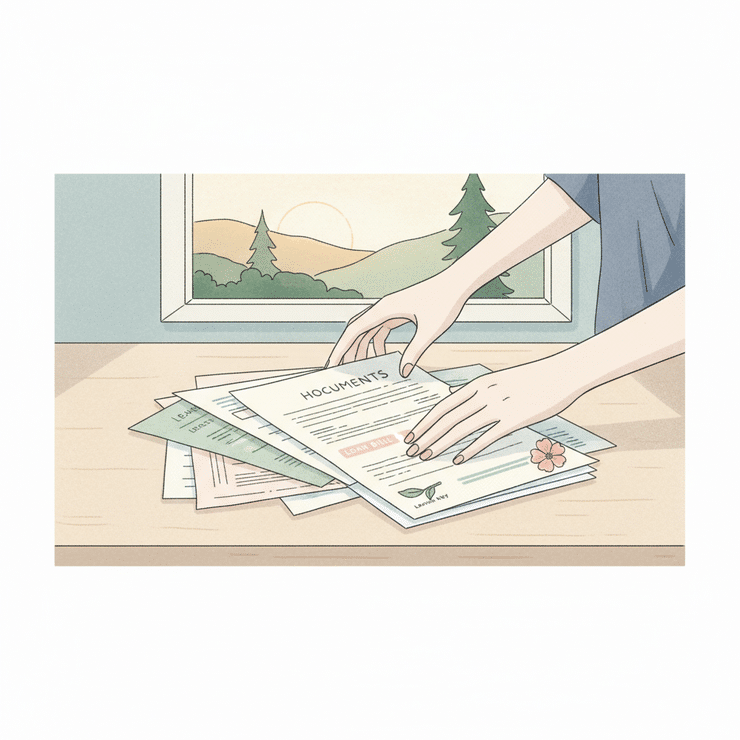
If you actually manage to land a Section 8 voucher in North Carolina, your rent drops to something you can breathe around—usually 30% of your income. That means you can finally stop living month to month, panicking about whether you can afford groceries or meds. Real talk: North Carolina’s wait times aren’t as horrific as other states. Average is 21 months here (yeah, that’s still almost two years, but it’s better than three or five). This is the rare upside—if you’re on the list, you’re already ahead of folks in bigger cities or different states who literally wait half a decade.
Here’s what nobody tells you: Smaller or rural counties in NC move faster. Why? Less competition. People flock to the big counties thinking they’ll get more help, but that just means longer lists. If you can swing it, apply everywhere you can commute or tolerate living. Don’t sleep on PBVs (Project-Based Vouchers), especially if you’re a senior or have a disability—those can move you up the line. PBVs tie your voucher to a specific property, which isn’t as flexible, but it’s a real shortcut if you’re desperate.
The Bad
Now for the wall you’ll run into: The lists are long, the process is slow, and you’re going to fill out the same info over and over. Get ready for vague answers, months of silence, and feeling like you’ve been ghosted by the entire system. Sometimes the waiting list will close while you’re literally filling out the damn form. No warning, just “Sorry, try again next year”.
And there are scammers everywhere. If any website or “helper” asks for an application fee, run. The only money you ever pay in this process is your actual rent once you have a place—never for applying, never for “priority status.” Scammers will make fake websites that look official and even run ads on Facebook. If you’re searching, use phrases like “Section 8 [your county] housing authority” and double-check that the site ends in .gov or is clearly a real agency.
The Ugly
Now here’s the truth nobody wants to say out loud: You might wait two years. You might get bumped for some technical nonsense—wrong paperwork, missed deadline, or just because someone lost your file and won’t admit it. Housing authorities are notorious for losing paperwork, not returning your calls, and closing lists for months or years without warning. There are places that will never call you back, no matter how long you wait.
The system is not fair or fast. It’s not built to be easy. The only people who get through are the ones who refuse to give up—who call, check, re-send paperwork, and never assume “no news” is good news. Persistence is literally the only reason most people ever get housed. Yeah, it’s messed up, but that’s the reality. If you’re not relentless, you’ll get left behind. So get organized, expect nothing, and keep pushing—because nobody is going to do it for you.
Take Action Today
What You Can Do Right Now to Get Section 8 in North Carolina
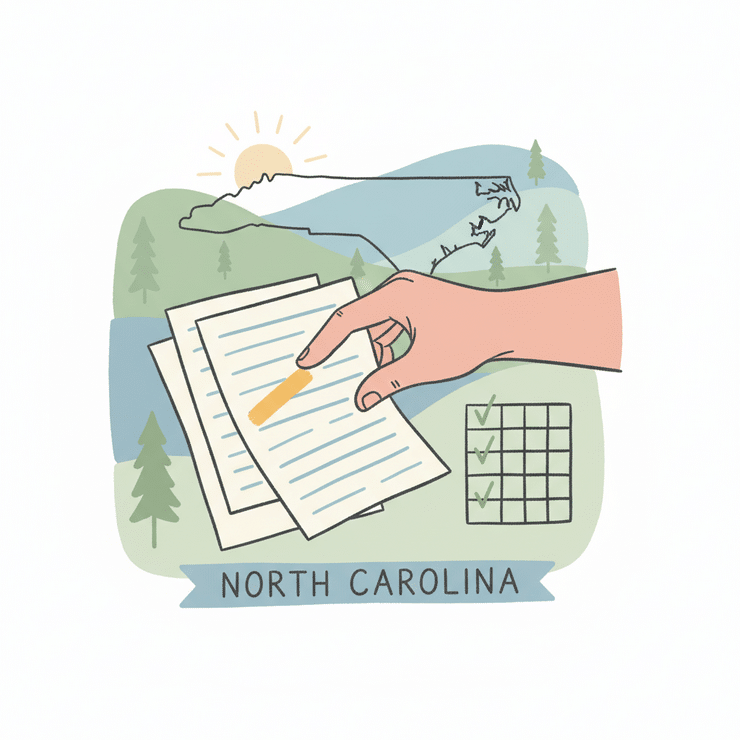
Listen, this is not the time to overthink. The truth nobody tells you? People get Section 8 in North Carolina by being relentless and just a little bit ruthless about paperwork and hustle. Here’s what actually works:
- Make your list of every housing authority within 50 miles. Yeah, every single one. Google “[your county] housing authority” and keep going—don’t just stop at your county. If you’re near county lines, check both sides. If you’re in a city, check the city and the county. Some programs are city-based, some are county, some are regional. You want every possible door. Don’t trust the first website you see—some are so outdated it’s embarrassing. Cross-check names and double-check addresses. Write them all down. You want a list you can actually call and visit, not just a mess of tabs open on your phone.
- Get those documents together, tonight. I mean it. Birth certificates, Socials, IDs, pay stubs, benefit letters, lease info—anything that proves who you are, where you live, how much you make, and who’s living with you. Don’t wait until they ask; have it ready to slap down. If you don’t have something, write down what you’re missing so you can chase it tomorrow. The truth: they will toss your app for missing paperwork and move on to the next person without blinking.
- Join every relevant Facebook group and set your notifications to ‘all posts.’ Search for groups like “[your city] housing help,” “NC Section 8 waitlist updates,” and “North Carolina renters support.” Yes, you’ll see a lot of spam and drama, but you’ll also get real-time alerts when a list opens or someone drops a tip about a landlord actually taking vouchers. That’s how a lot of people find openings before the official announcements.
- Make your spreadsheet and start tracking today. Don’t overcomplicate it. Just list every housing authority, the date you applied, what they said, and when you need to follow up. Color-code it if you need to. The people who actually get through this mess are the ones who treat it like a second job, not a one-time thing. If you wait until you feel organized, you’ll still be waiting when the next list opens and closes in three hours flat.
Don’t Wait for a Perfect Moment
Here’s what actually happens: if you wait for your life to calm down, for the system to feel less hostile, for the paperwork to make sense—you’ll be waiting forever. The system is not built to be easy or welcoming. The people who get housing are the ones who jump NOW, even if it’s messy, even if their papers are in a folder with ketchup stains, even if they’re scared. Apply first, organize later. The deadlines do not care about your situation; they just close. Don’t let them slam the door while you’re still hesitating.
Remember: You’re Not Alone
This fight isn’t just yours. There are thousands—yes, thousands—in North Carolina grinding through the same broken system, trying to get a spot. The truth nobody tells you: you don’t have to be perfect, just persistent. Some days will suck. Some days you’ll want to throw your phone at the wall. But every single day you push, every call you make, every doc you scan is one day closer to getting the stability you deserve. Don’t let the system win by wearing you down. You’re not alone, and you’re not out of options until you quit. So start tonight. No excuses.